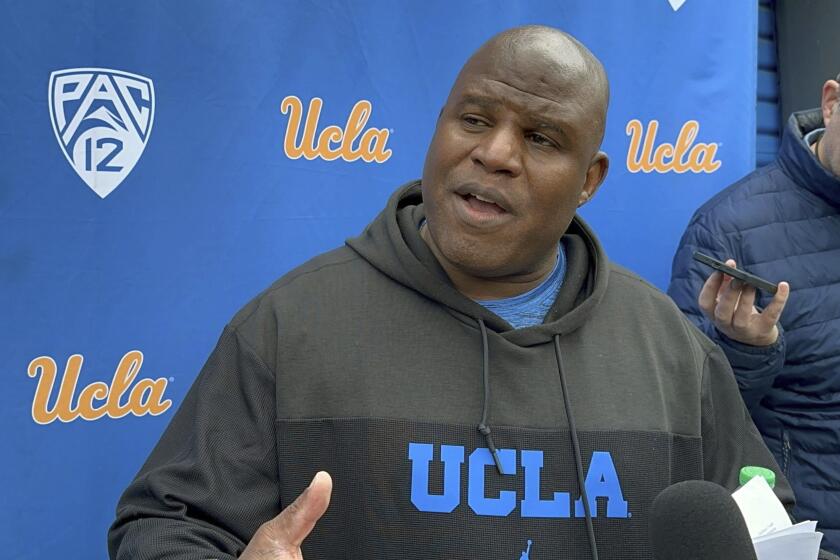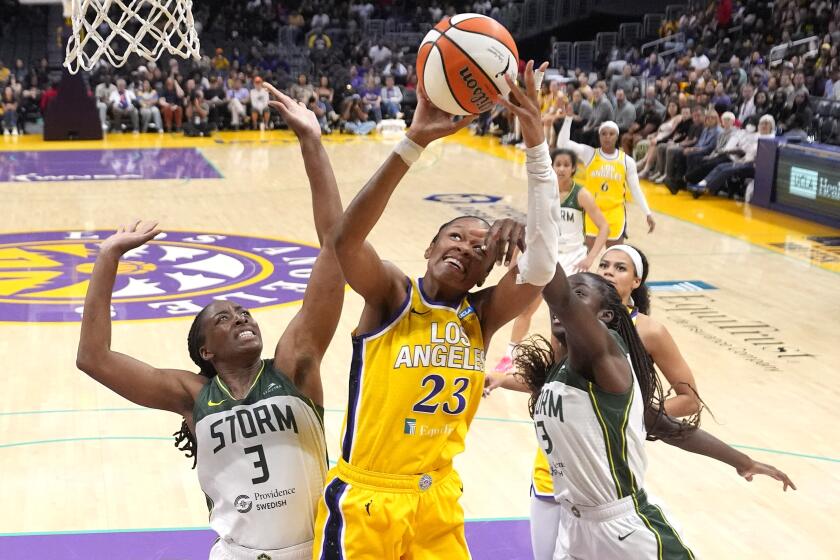Replay isn’t needed, perfect isn’t the point
Perfection has been imperfectly busted before. What is different today is that suddenly it seems the entire Western world wants Major League Baseball to fix it.
Folks are screaming for Commissioner Bud Selig to reverse an umpire’s blown call that on Wednesday stole Detroit Tigers pitcher Armando Galarraga’s place in history. The human beauty of baseball screams otherwise.
Galarraga, a 28-year-old with 21 career victories, had seemingly completed perfection — no hits, no walks, no errors, 27 consecutive outs — by inducing Cleveland Indians shortstop Jason Donald to hit a grounder to the left of first base.
Miguel Cabrera scooped it up. Galarraga ran over to cover first. Cabrera made a perfect throw. Galarraga made the perfect catch. The ball clearly beat Donald by a step for the final historic out of the perfect game. And the celebration was on ....
Except first base umpire Jim Joyce called Donald safe.
And now there are screams for Selig to immediately install full use of instant replay — it’s currently only used on disputed home-run calls — so this sort of blunder will never happen again.
Lots of people suddenly want baseball to be something that it’s not. Lots of people suddenly want baseball to be — gulp — football.
Thankfully, Selig resisted that temptation Thursday, issuing a statement that lamented the situation — “There’s no dispute that last night’s game should have ended differently,” he said — but making no mention of reversing the call, which would have been a mistake far bigger than anything that happened Wednesday.
What baseball did, and should continue to do, is swallow hard and accept that what makes it so vulnerable is also what makes it so cool. It’s our most human of sports, guided by our most coveted virtues and dreaded frailties, championships won in the blink of a dust-filled eye, history lost in the breaking of a blackened fingernail.
If Selig suddenly changes this bit of bungled history, what does he do with all that came before it?
If he gives Galarraga his perfect game, doesn’t he have to give the St. Louis Cardinals the 1985 world championship? They came within three outs of clinching it against the Kansas City Royals — until umpire Don Denkinger’s bad call changed everything.
If he takes care of Galarraga, doesn’t he also have to address the case of Jeffrey Maier, the 12-year-old boy who became a New York Yankee hero in the 1996 playoffs when he deflected a Derek Jeter fly ball into the stands against the Baltimore Orioles? The hit was wrongly ruled a home run, and the Yankees used it as inspiration to eventually begin a string of world championships.
What should have been the final play of a perfect game Wednesday was so obvious that the television announcers initially shouted, “Out!” It was so clear, the Tigers began celebrating. It was so wrong, Joyce later did something umpires rarely do — he admitted he had blown the call and publicly apologized.
And that should have been the end of it. The Tigers win, 3-0. Galarraga throws a forever famous one-hitter. Stuff happens. It’s baseball. There have been only 20 perfect games in baseball history because, at some point during the normal nine innings of a game, somebody is always blowing it. A shortstop loses a pop fly in the sun. A catcher drops a third strike. A pitcher loses his grip on ball four.
That Wednesday’s perfect game was ended in the final moments by an umpire’s decision was yet another bit of baseball humanity — and doesn’t even make that game unique. Just ask Milt Pappas, the Chicago Cubs pitcher who was denied a perfect game against the San Diego Padres in 1972 when umpire Bruce Froemming called consecutive balls on close two-strike pitches to the 27th batter, Larry Stahl, allowing him to walk.
Good that Selig did not touch this game, and even better if he does not get sucked into the sentiment of fooling with more instant replay. It works in football, but football is a game of yards. Baseball is a game of inches, where, if replay were expanded, it could be used constantly, slowing down the simple game even further, stopping its life-mirroring ebbs and flows.
The games are decided by runs. Instant replay is used for the most sudden of those runs, the home run, and that should be enough. If there were instant replay Wednesday night, who knows if a close call on the bases or behind the plate would have been overturned that would have robbed Galarraga of perfection long before that apparent final batter?
“Given last night’s call and other recent events, I will examine our umpiring system, the expanded use of instant replay and all other recent events,” Selig said in his statement.
The only thing that needs to be expanded today is our belief that ancient, awkward baseball still brilliantly works.
Through Wednesday’s maelstrom there appeared some memorable moments. Joyce apologizing. Galarraga accepting that apology. And then, Thursday afternoon, Joyce umpiring home plate when Galarraga brought up the lineup card before the game.
Did you see what happened next? Joyce cried. Galarraga patted his back. Joyce patted Galarraga’s back. The pitcher returned to the dugout, the umpire returned to his crouch, everyone went back to work, another day, another ballgame, another glimpse of the lost soul of sports.
Perfect.
More to Read
Go beyond the scoreboard
Get the latest on L.A.'s teams in the daily Sports Report newsletter.
You may occasionally receive promotional content from the Los Angeles Times.











